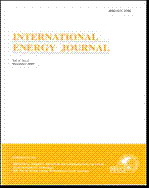ThaiScience
ThaiScience
INTERNATIONAL ENERGY JOURNAL
Volume 21, No. 03, Month SEPTEMBER, Year 2021, Pages 289 - 296
Characterization of phase separation and upgrading of hardwood derived bio-oil using alcoholic solvents
Manjula Siriwardhana
Abstract Download PDF
Bio-oil produced by fast pyrolysis of hardwood was studied. It was observed that bio-oil was phase separated after 15 hours during accelerated aging at 80 ⁰C and the proportion of the viscous bottom phase continued to gradually increase with prolong aging. The chemical compositions of each phases proved that phase separation of bio-oil is not an effective tool to segregate undesired components into a single phase. GC-MS analysis shows that, during accelerated aging, some phenolic, sugar, ketone, ester, acid, furans and aldehyde components are disappearing from the bio-oil and these components might undergo polymerization or condensation reactions with the heavy pyrolytic fraction of biooil. The addition of solvents greatly retards phase separation. Amongst the various alcohols tested (isopropanol, ethanol, propanol and butanol), isopropanol is the most effective in retarding phase separation. These polar solvents change the chemical composition by reactions such as esterification. Addition of 10 % of isopropanol prevents the phase separation for 13 days at 80°C.
Keywords
Bio-oil, Bio-oil aging, Bio-oil upgrading, PyrolysisINTERNATIONAL ENERGY JOURNAL
Published by : Asian Institute of Technology
Contributions welcome at : http://www.rericjournal.ait.ac.th
